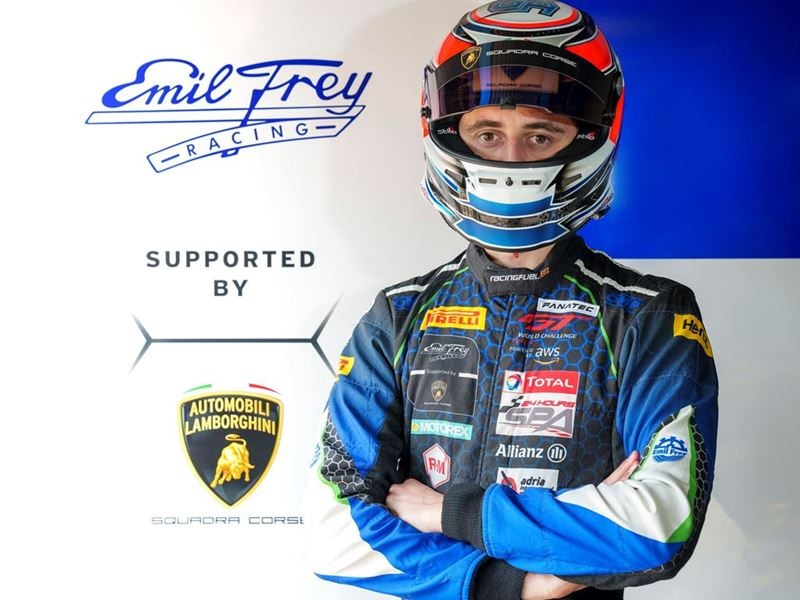The Lamborghini Super Trofeo is a reference point in the global panorama of one-make championships, divided into three different continental series: North America, Asia and Europe, which each year, at the end of the season, compete in the Lamborghini World Final. There are six rounds on the calendar for each series, each consisting of free practice, qualifying, and two 50-minute races, and four categories of drivers complete: Pro, Pro-Am, Am and Lamborghini Cup.
Since 2018, the star of the series has been the Lamborghini Huracan Super Trofeo Evo, a racing car with a 620 hp V10 engine built on the same production line as the super sports cars in the factory in Sant'Agata Bolognese. Each car that races in the Super Trofeo is managed by private teams supported on the track by official Lamborghini Squadra Corse technicians.
Since 2009, the Super Trofeo has produced exciting races full of celebrities, behind-the-scenes stories and curiosities. Here are five things you might not know yet:
1. VIPs on the grid
Many familiar faces have competed in the Lamborghini Super Trofeo. One of these is nine-time motocross world champion Tony Cairoli, who took part in the World Final 2019 in Jerez de la Frontera, paired with five-time 24 Hours of Le Mans winner Emanuele Pirro. That same year, supercross star Chad Reed made his mark in the North American series. Andrea Dovizioso, a former MotoGP racer with Ducati, starred in the Valencia race in 2016 with two class victories, finishing as the Pro-Am world vice-champion.
Thirteen drivers from F1, including the Italian Ivan Capelli, Nicola Larini, and Andrea Montermini, the British Martin Brundle and the Venezuelan Johnny Alberto Cecotto, father of young Jonathan, a Lamborghini Young Driver, competing this year in the European series.
2. Never change a winning format
Thirteen drivers from F1, including the Italian Ivan Capelli, Nicola Larini, and Andrea Montermini, the British Martin Brundle and the Venezuelan Johnny Alberto Cecotto, father of young Jonathan, a Lamborghini Young Driver, competing this year in the European series.
2. Never change a winning format
Every weekend of the Lamborghini Super Trofeo consists of 260 minutes of track time, divided into two free practice sessions, two qualifying sessions, and two races of 50 minutes each. This format allows younger drivers to gain experience and gentlemen drivers to drive for an extended time with the option of sharing the seat with a teammate. From 2009 to the present, including the two races in Monza on April 17 and 18, the total race time has been 309 hours, 40 minutes and 53 seconds.
3. Make way for the new generations
3. Make way for the new generations
In
2020 some 31 drivers made their debut in the Lamborghini Super Trofeo
Europe, 14 of them in the North American series. There will be ten
drivers under 21 on the starting grid in Monza for the first round of
2021: almost one-third of the grid. The common goal is to be selected to
participate in the Lamborghini Young Driver Program and embark on a
career as a professional driver, following in the footsteps of Giacomo
Altoè. In 2018, at just 17 years old, Altoè won the Super Trofeo Europe
and the World Final in Vallelunga, also winning the Italian Gran Turismo
Championship at the wheel of a Huracan GT3. A path that in just a
couple of seasons led him to become an official Lamborghini driver and
to race in the most prestigious GT championships in the world.
4. Headed towards 1000
In 13 editions, the Lamborghini Super Trofeo starting grids have seen 955 drivers of 66 different nationalities, with 525 of them taking part in the European series. There were also 18 women drivers at the start, including the British Pippa Mann, who has competed in seven Indy 500s in her career, and her fellow countrywoman Katherine Legge, who has competed in nine 24 Hours of Daytona.
5. All the tracks in the world
5. All the tracks in the world
Since its first edition, the Lamborghini Super Trofeo has been run on 47 tracks: 18 in Europe, 13 in Asia, 14 in North America and two in the Middle East. Conceptually it’s like a single ribbon of asphalt of 216 km, winding its way through the most iconic circuits in auto racing, such as Spa-Francorchamps, which stretches over 7,000 m in the Belgian forest of Ardennes. Or Monza, the temple of speed par excellence, Imola, Le Castellet and Nurburgring, all historic F1 circuits, and continuing with Watkins Glen and Laguna Seca in the United States, Suzuka in Japan and Shanghai in China.


























